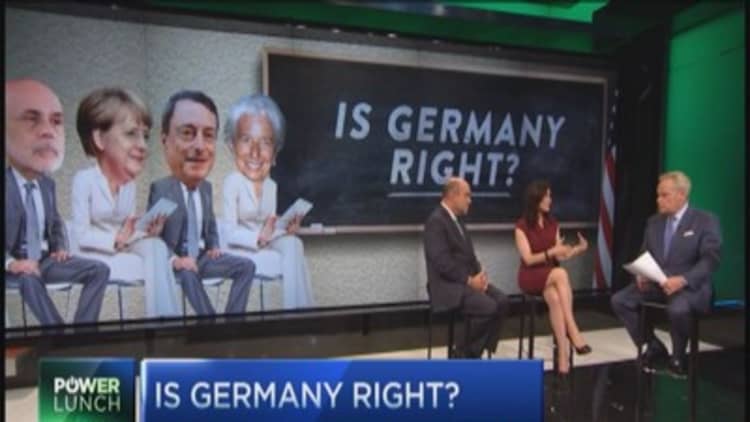Euro zone inflation ticked up in October, bringing some much needed relief for the European Central Bank (ECB), although the rate remains well below its target of around 2 percent.
Consumer prices rose by 0.4 percent year-on-year in October, according to official statistics published by Eurostat on Friday. The figure met analyst expectations, and marked a slight rise from September's 0.3 percent.
Read More'Never says never' to QE in euro zone: Policymaker
However jobless data, also published Friday, provided little cause for celebration, with the euro zone's unemployment rate holding steady in September, at 11.5 percent.
Inflation relief?
Price growth has dogged the euro zone's stuttering economic recovery for months, and led to concerns that the region is close to slipping into deflation. In an effort to combat this growth-sapping low inflation, the European Central Bank (ECB) has launched a host of stimulus measures, including cutting interest rates to record lows and announcing plans to purchase covered bonds and asset-backed securities (ABS).
But worries remain, and there is growing speculation that the ECB may need to start buying sovereign bonds—known as full-blown quantitative easing (QE)—to stump up the economy. In the second quarter, euro zone gross domestic product came in flat, with zero growth.
Friday's euro zone-wide inflation data comes after figures for Germany—the euro zone's largest economy—missed expectations on Thursday. The preliminary figure indicated that annual inflation slowed to 0.7 percent in October—the weakest since May and below forecasts of a rise to 0.9 percent.

Ben Brettell, senior economist at Hargreaves Lansdown, noted that despite the "marginal" pickup in euro zone prices, the core consumer price index (CPI)—which excludes more volatile components like food, energy, alcohol and tobacco—fell to 0.7 percent.
"As such, today's data does little to relieve the pressure on Mario Draghi to embark on a quantitative easing program," Brettell said in a note.
"I believe he will succumb to this pressure eventually, though probably not in the short term."
ECB Governing Council member Ewald Nowotny refused to rule out a U.S. Federal Reserve-style QE program for the region on Friday.
"I think that we have all learned in life that we should never say 'never'," Nowotny, who also heads the Austrian central bank, told CNBC when asked about the possibility of QE.
Read More'Damaging deflation' threatens euro zone: EY
The ECB will announce its latest monetary policy decision on Thursday, and most economists are not expecting any change to interest rates, or new policy announcements.
"It looks likely that ECB policymakers will adopt a wait-and-see stance to assess whether their latest policy measures have the desired effect," Brettell said.
—By CNBC's Katrina Bishop


